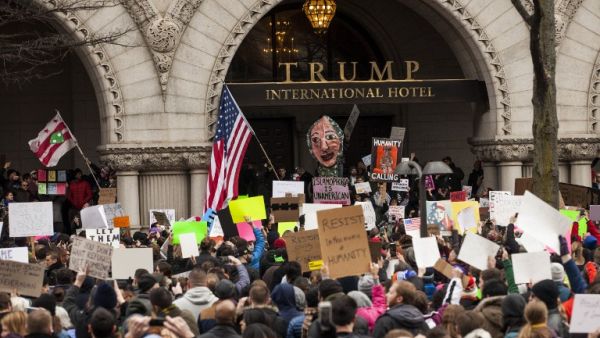Iraqi politicians are mulling "reciprocating" Trump's travel ban on Iraqis and citizens from six other Muslim-majority countries as diplomats express fears over strained ties between the two countries, which are key partners in the war against Daesh.
The Baghdad parliament's foreign affairs committee issued the call on Sunday following a meeting in the capital to discuss the US President's visa ban on Iraqi nationals.
"We clearly demanded that the Iraqi government deal reciprocally in all issues... with the United States of America," Hassan Shwairid, the deputy head of the Iraqi parliament's foreign affairs committee, told AFP.
Because of its role in fighting Daesh, Iraq is worthy of special treatment rather than restrictions, Shwairid said.
"It is not possible for Iraq to fight (Daesh) today on behalf of all countries of the world (and) be dealt with like other countries," the lawmaker said.
Shwairid said that the call did not apply to the thousands of American military personnel in the country as part of the US-led coalition against Daesh.
It "is not related to the soldiers because they are present in the framework of the forces of the international coalition", he said.
"Intensive meetings are taking place now and a crisis cell was formed in the foreign ministry to discuss the stance of the American administration," a foreign ministry official said on condition of anonymity.
Iraq's influential Iran-backed paramilitary Hashd al-Shaabi, which are helping in the battle for Mosul, went one step further by urging that Americans in the country now be expelled.
Trump's travel restrictions also drew condemnation from populist Shia cleric Moqtada al-Sadr, a thorn in America's side for much of its 2003-2011 war.
"You enter Iraq and other countries with all freedom and prevent their entry into your country," Sadr said in a statement.
Sadr condemned this as "arrogance" and told the US to "get your nationals out before removing expatriates".
It has also been revealed in a leaked memo that American diplomats at the US embassy in Baghdad were blindsided by the order and warned the State Department of the consequences of upending delicate US-Iraq ties when Islamic State is on the cusp of defeat in the country.
The memo, sent to the State Department, seen by The Wall Street Journal, showed that diplomats felt it disproportionately affected Iraq and urgently warned that it could do lasting harm to bilateral relations.
The memo detailed a list of potential repercussions, for example, it said a top Iraqi general leading the fight against Daesh would be unable to visit family in the US.








